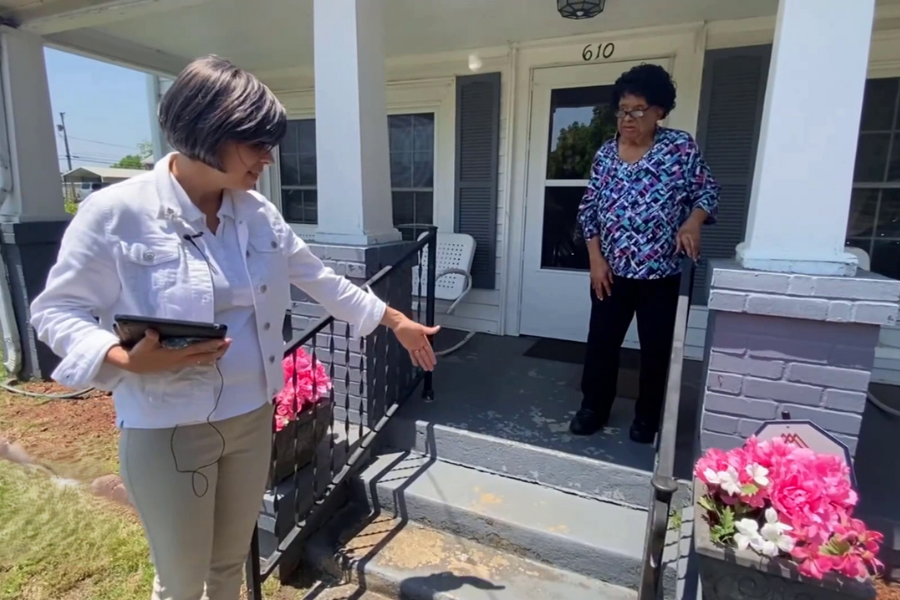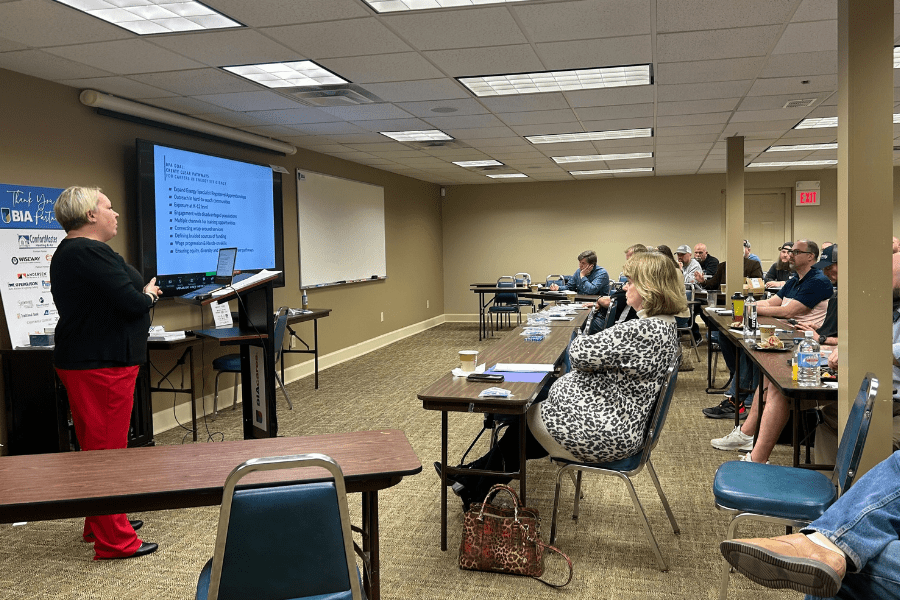Mar 7, 2022
The XX Factor
In honor of Women's History Month, we're revisiting an article from 2013 called "The XX Factor," which highlights the Women in Home Performance Initiative. The article features an interview with Ann Atkinson and discusses the challenges women face in male-dominated industries. Let's discuss what's changed for women in the industry since the article was published.
By: Macie Melendez

In honor of Women’s History Month, we’re taking a look at our archives—specifically at content we’ve published related to women in home performance. This week, we’re sharing an article I wrote in 2013 titled, “The XX Factor.” Right on the heels of a then-named Affordable Comfort Institute’s formation of the Women in Home Performance Initiative, this article features an interview with Ann Atkinson.
For background, the Building Performance Association was formed through the re-alignment of three organizations. The Association now consists of the assets and staff from Efficiency First, Home Energy Magazine, and the Home Performance Coalition, which itself was the result of a merger of Affordable Comfort, Inc. and the National Home Performance Council (NHPC).
After reading this article, think about what’s changed (or hasn’t) for women in our industry since this was originally published 9 years ago. Leave me a comment and let’s discuss.
The XX Factor
ACI launched a new initiative in February of 2012 to address challenges, remove barriers, and promote opportunities for women in the traditionally male-dominated home performance and weatherization industry. It is called Women in Home Performance, and it presents a forum for business development, education, mentoring, and networking through webinars, ACI events, a LinkedIn discussion group, and online trainings. Both men and women are encouraged to participate in the initiative and discover the unique skill sets that women have to offer this industry.

To find out more about the initiative, we spoke with Ann Atkinson (pictured at right), a mentor who led discussions for Women in Home Performance online in a webinar this past summer. Ann also led discussions at a meeting held in Pittsburgh during the ACI Mid-Atlantic Home Performance Conference; and she will be presenting a new four-part online course—Women on Board: Training Women to Be Leaders in the Boardroom—starting in February 2013.
Ann is CEO of Atkinson & Associates, LLC, a consulting firm specializing in strategic planning, organization design, change management, board of director training, organizational culture, future trends, franchising, leadership mastery, emotional intelligence, and systems development. Ann has more than 35 years of experience, having served as interim chief executive officer for Equitable Real Estate Investments and chief operating officer for three major organizations in both the for-profit and the nonprofit sectors.
Q&A with Ann Atkinson
Macie Melendez (MM): Tell us why you got involved in the Women in Home Performance initiative at ACI.
Ann Atkinson (AA): I believe in the vision and mission of ACI and of this initiative in particular. There certainly needs to be a central point for dialogue, research, advocacy, and education on essential topics facing this industry, one that includes the issues women encounter professionally. ACI fills that gap.
MM: What are some of the biggest issues that women face today in a male-dominated industry like home performance?
AA: By 2050, census reports indicate there will be more women than men in the United States. Currently, there are more women graduating from college with professional degrees, such as law, accounting, etcetera. That is going to eventually bring a change in the way business operates, both nationally and globally. Those women who prepare now will be better prepared for higher leadership roles in the future.
The second issue facing women is [how to gain a] broader understanding of how women can help each other. Men have already learned how to do that. Women have been extremely slow to support each other. Yes, there are some women recommending other women for work, but that could be accelerated by a factor of 10 or 20. And it really needs to start now.
The third issue is that male-dominated industries are becoming a minority scenario, and, as I mentioned previously, will slowly disintegrate. That, coupled with the fact that women have enormous buying power and influence over much of the economic market—including housing—generates a power that needs to be embraced.

The last issue is that women need to take pride in their leadership skills and step forward. Women have essential skills that are required in the workplace of the 21st century, and all of us need not apologize for that. Whether a CEO is a woman or a man should not be the issue; the issue should be achieving the desired measurable results. Period.
MM: How do those issues affect women’s advancement in the workplace?
AA: In many workplaces there is an unspoken double standard that still exists. A common example relates to how leadership skills are judged. “Good” leaders are expected to be strong, confident, and assertive. Yet when women behave in these ways, they are often perceived as being uncaring, self-promoting, and aggressive—all of which have negative connotations. However, when women act in more collaborative ways, they are viewed sometimes as lacking leadership skills because they compromise too easily. Not only can these perceptions negatively affect women’s advancement, they can also impact their salaries, their perceived status among coworkers, their overall sense of security and safety in a company, as well as their stress levels.
Another example that comes to mind of the hidden bias that exists in the workplace is when the current CEO of Yahoo was pregnant on the job. The news was quick to cover, not her skills, but the fact that she was the first CEO who was ever pregnant on the job. Ridiculous!
MM: Do women in every industry face the same kinds of issues in the workplace?
AA: Yes. The issues are universal for women. Again, there needs to be a stronger sisterhood of support, encouragement, mentoring, and recommending other women for work. Is it better now? Marginally so. We just don’t talk about it as much.
MM: In order to be a successful initiative, where do you see Women in HP going in the future? In other words, how would you define success for the initiative?
AA: When every major association involved with home performance, including the real estate industry, the construction industry, air conditioning, education, banking, health, government, chambers of commerce, inspectors, etcetera sends its female leaders to take part in this initiative, I would view that as successful. We cannot pigeonhole this type of initiative and training, because it is for every woman who aspires to become a leader and have a voice in her own community.
MM: What specifically can women do to help support one another?
AA: First, they can recommend each other—that is, use female consultants, lawyers, brokers, accountants, etcetera. Next, mentor every female you can, no matter what her age or position. And lastly, encourage women to actively pursue both personal and career development constantly. It comes in many forms and is made available to us in numerous ways. We just need to be open to them. Knowledge is the only competitive edge.
MM: What specifically can men do to ensure that women are advancing appropriately, and that their voices are heard as much as men’s?
AA: Well, I certainly have opinions on that, but I think you should ask some men that question. My specific answer is to evaluate a person on achieving the desired results of the position, regardless of gender, race, ethnicity, sexual orientation, or any other form of bias.
MM: Women are often stereotyped (in all industries and areas of life) as being too emotional and sensitive. Does the Women in HP initiative address these stereotypes (or others) as they fit into the roles of home performance?
AA: The act of stereotyping anyone speaks to the lack of sophistication in the world. More troubling to me is the fact that women do it to each other by looks, by clothes, by money, by any number of things … by being derogatory about each other. How many men do you hear doing that to each other? Women have to be open to all women in order for every woman to advance.
Plus, we need to consider our prejudices against certain characteristics, such as passion and sensitivity. Why are they viewed as negative traits? Being an effective salesperson today relies on developing a connection and forming relationships. Being sensitive to your clients’ needs or relating to them on an emotional level can establish long-term loyal customers. Perhaps it is time we throw convention out the window, take a look at the strengths people have, and see how they can be used effectively to achieve the desired results.
The Women in Home Performance initiative is developing content to address these types of issues through webinars, meetings, and online trainings.
MM: I read that women are paid $0.83 to the $1 that men make on the job. It’s hard to believe that this is still an issue in 2012. What do you think we can all do, as women and as an organization, to change that?
AA: Actually, the figure I’ve seen (published by ASAE) is $.74 for every dollar a man makes, which is even worse. As I have said at some of my workshops, the reason women are made leaders of chambers or associations is because they are willing to work cheap.
Women need to better understand what appropriate salaries look like in their field and then not be afraid to ask for them. The attitude of self-belittlement has just got to stop. If I have a job to do and I reach or exceed the desired results, I should be rewarded for it at a competitive rate, regardless of my gender.
This article originally appeared in Home Energy magazine, which is the eJournal’s predecessor publication. We’ll be publishing more women in home performance content from our archives throughout this month.





